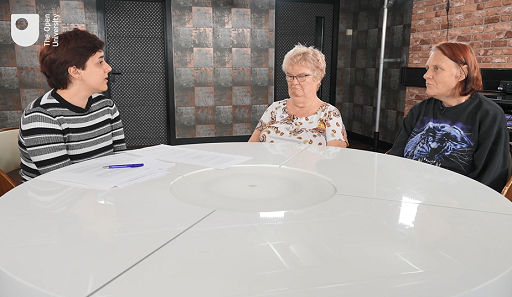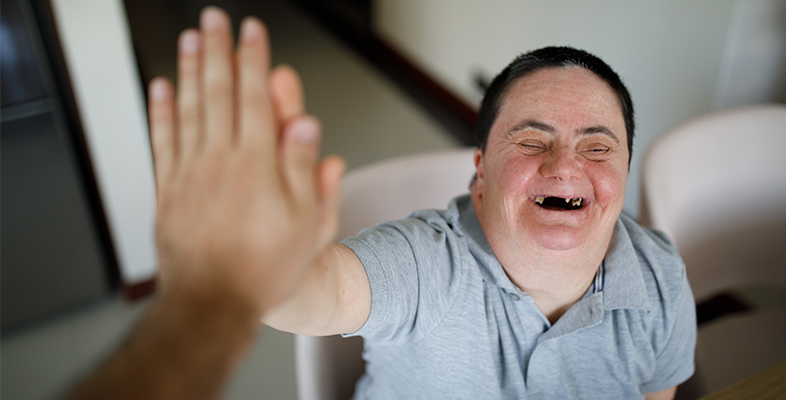3 Planning ahead for older age
While it is clear that Becky is content living at home with her family and well supported by the day service provider, proactive plans are needed for the future.
Activity 3 What next for Becky?
Listen to Becky’s mum reflecting on why it is now so important to get plans in place as Becky and her parents get older:
Transcript
Well I think we have to think about, we’re getting no younger, and what will happen when we can no longer care for her? To sort of start thinking about what can be in place, for if anything, would happen that myself and my husband were unable to care for her just through old age and general practical sides of us not being... maybe as physically able as we were and this kind of thing, that our health deteriorates, then obviously we would need more help with her and probably with a view to finding a placement for her as she gets older... when she has a review is to say, look, we need to get something in place over the next two or three years and to get her you know, hopefully if something happens that she would have already been used to, in you, maybe going somewhere, interacting, you know, that there is some other stability there like with [the centre] that what we would obviously hope is that she could become part of the [the provider], I'd put it in brackets, ‘family’, if you know, that she could be accommodated within their setup, housing and supported living... I think in a way it's essential because otherwise I think you know, if something happened to us it's suddenly how the problem falls back on the rest of the family, who have their own independent lives and things, that there is a plan in place, or Becky is settled somewhere, you know, not losing contact with us or anything but that something is there... I’m 71 and [my husband] is 75 (…) I think to a certain extent social services are aware of our age and everything, we have had odd things about this. But also I think because we have had support with respites and other things that it hadn't become, you know, we've been managing (…) I mean I know there is a sort of an emergency care plan, possibly in place, that was done quite a long time ago, that Rebecca would if she needs sudden care, it would be done through the respite service we have, that that would be the first port of call, that she would be treated as an emergency and go to where she normally has respite, you know?
Now watch the panel talking about Becky’s situation.

Transcript
LISA: I guess I want to know what you guys think about Becky’s situation really.
PAM: Not in a good place because she needs to find somewhere else to live. She’s been living with her parents for so long.
LISA: Yeah. Yeah, so as they get older, her parents especially, they need to start thinking about those things. Do you think it’s surprising to hear that maybe they haven’t really spoken much about that or thought about that?
PAM: No, I think they should have spoke about it sooner. Because they’re now in their 70s and she’s 45, and I think they should have started way back before they got older theirselves.
LISA: What do you think about it, Dawn.
DAWN: Well, yeah like Pam said, they should start earlier because if they pass away suddenly, then Becky’s got nowhere in place, does she? So she could be ending up in a secure unit.
LISA: And then what kind of other professional support might they need thinking about those things?
PAM: Maybe a psychiatrist or psychologist, social workers so they could get it to bed.
DAWN: The disability team.
GAIL: For planning for the future my advice would be really to start and really start to gather that information. We talk a lot at our organisation when we’re supporting families. We talk about literally a drop-dead book. And it’s a person-centred plan so when I did it for my son many, many years ago, I did call it my drop-dead book.
Because it was if anything happened to me, everything I knew, all that information that minute detail about how he ticked, what made him tick, what was important to him, how best to support him, all of the things that mattered, the key details, how he communicates, all of that stuff was all written down somewhere so that it could be handed over to somebody who had never met him before.
And a really useful thing to do which we do when we do our training is to say to parents, you’ve got 5 minutes to write down the most important details about your son or daughter. You need to leave in an emergency, and you’re leaving them with a complete stranger. What is the most important bits they need to know about your son or daughter now? And write that down.
So you’d be surprised how much information you can get in just 5 minutes writing that information. And then spend time gathering that detailed information for a person-centred plan to hand over to somebody else, but involve lots of other people. Involve people who know Becky really well. So it could be brothers and sisters, it could be people that support her at the day service.
Get a range of views from different people to help you gather all that information, so it’s not just your knowledge of Becky that’s moving forward, it’s everyone who knows and loves her as well involved in that. I think take it slowly. I think that’s why the planning is so important. I think the thing that scares me most about people not planning ahead, and there not being somewhere settled for them to go, if there is a crisis, that person could end up being sent hundreds of miles away from their family.
And I’m feeling wobbly just talking about it because it is really upsetting to think that somebody could lose their family member, they could lose their parent. And then be shipped out of county to somebody or out of area to somewhere new not knowing anyone, lose their community, lose all the things that they know, where they went to day centre, all their friends, everything because there’s nowhere for them to go locally, and because it hasn’t been planned ahead.
And I don’t want to scare families, but I do. You know what I mean? I really need them to think about that that is the alternative. So having those conversations early and starting with the conversation with your relative if you can.
Instead of saying, I don’t want to go. Saying, well, look, if this could happen, and I don’t want to frighten you but actually that we don’t want that to happen, do we? We want it to be careful and planned. I want to see you settled and happy living somewhere. I want to be involved in making sure that you have the right staff around you, that you can choose who you live with, that you can choose where you live, that we can come and still see you, and just reassuring people I guess.
I’d say that more support. I think it’s just a different way of providing support. It’s being mindful that they will not necessarily want the same as younger carers. Younger families have Facebook pages and all those sort of things, Whatsapp groups. And older carers won’t necessarily have all of those things. Although my mother is 85 and is on Facebook so don’t assume but have those conversations with people to, what is the best way for us to support you? Ask them. They’ll know what support-- in some ways how they want to be supported.
But peer- to-peer support. Hearing from people who are in the same situation as you is really, really powerful. People who’ve been there and done things but are the same age as you can be really powerful. We did a video of parents who had set up supported living for their sons, they had sons the three of them, called Piece of Mind which is available on our website I hope still.
And showing that, the other parents more of the same age are more likely to go, well, they did it, and they’re same age as us then we can do it. So it’s finding those things that are going to work for different people. It’s being person-centred as well when you’re actually with the parent and you’re supporting them because not assuming that everyone is different and recognising that everyone is unique in what they’ve been through, not assuming you know it all.
BEN: So Becky’s scenario around transitioning from the family home to her own home, supported living, is I would say fairly common. However, it’s obviously individualised to each person who’s wanting to move out on their own. In terms of support and who Becky’s parents and Becky should be speaking to, I’d definitely be involving social services in terms of support around housing, care packages if that’s required or wanted, physical health, the usual GP if community team are involved involve them.
But on top of that, what I would say is involve people who know Becky well as long as she’s happy with that. So if Becky attends this day service, she’ll have support workers there I’m assuming who know her very well. She might have friends there who know her very well. She might have-- it wasn’t explicitly said in what you’ve just outlined whether Becky had siblings. Involve people who know Becky well and care about her in order to support her, to discuss her own future.
I think that it’s really important to have that circle of support around somebody when they’re making a really big life decision. And it’s not just for Becky. It’s obviously a big thing for Becky’s parents. So it might be that Becky’s parents want some support. They may have friends who know Becky well that could also be involved in just supporting that process, whether it be the actual discussions around where Becky may live, or where she wants to live, or what she wants to do, or if it’s just being that support to Becky’s parents.
The panel raised a number of important issues in relation to Becky’s situation. They advised families and professionals to start the planning process immediately to help prevent a move to an unfamiliar place in the event of a crisis. The panel also made suggestions for the type of support individuals and their families might need as they begin the planning process and how health and social care practitioners can help with this. The key piece of advice for professionals working alongside people like Becky and her family is to approach the task of planning ahead in a person-centred way (person-centred both in terms of the individual and their family carers). It is also important to involve the individual, their family, and others who know them well, when making decisions about the future.
